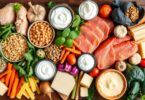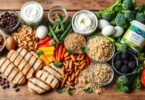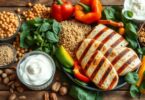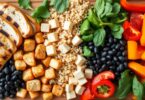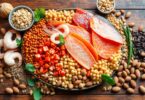“Nutrition is the only remedy that can bring full recovery and can be used with people of all ages and with all diseases.” – Bernardine Beatie, renowned nutritionist and author.
Adopting a diet rich in protein is crucial for maintaining health and wellness. Protein is essential for tissue building and repair, regulating bodily functions, and providing sustained energy. By integrating a variety of protein-rich foods into your daily meals, you ensure your body receives the necessary nutrients to thrive.
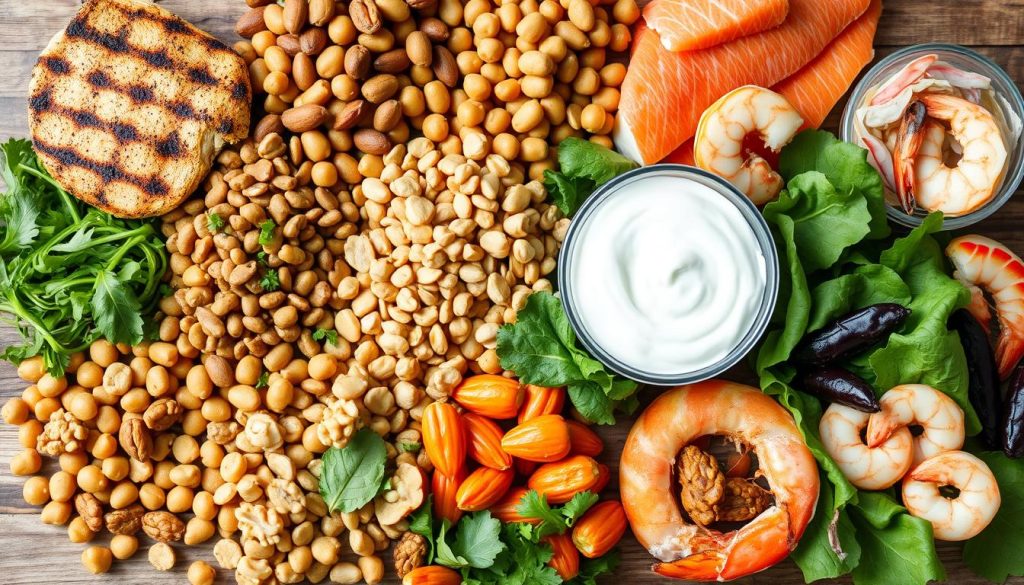
Key Takeaways
- Protein is a macronutrient crucial for muscle growth, repair, and overall body function.
- Lean meats, fish, eggs, and dairy products are excellent sources of complete, high-quality protein.
- Plant-based options like legumes, nuts, seeds, and whole grains also provide valuable protein.
- Timing your protein intake and choosing nutrient-dense sources can optimize its benefits.
- Incorporating a variety of protein-rich foods into your diet supports a healthy, balanced lifestyle.
Understanding the Importance of Dietary Protein
Protein is a fundamental macronutrient, essential for our health and well-being. It is vital for the growth, repair, and maintenance of our body tissues, such as muscles, bones, and organs. Additionally, it plays a crucial role in muscle building and weight management, making it a cornerstone of a healthy lifestyle.
Daily Protein Requirements by Age and Activity Level
The daily protein intake varies based on age, gender, and activity level. Adults generally need 0.8 to 1.2 grams of protein per kilogram of body weight daily. Yet, athletes, bodybuilders, and those aiming to build or maintain muscle may require 1.6 to 2.2 grams per kilogram of body weight daily.
Role of Protein in Body Functions
Protein is integral to numerous bodily functions, including:
- Enzyme production, which facilitates chemical reactions in the body
- Hormone regulation, which helps control various bodily processes
- Immune system function, which protects the body from illness and disease
- Tissue repair and regeneration, which is essential for healing and recovery
Signs of Protein Deficiency
Inadequate dietary protein can lead to several health issues, including:
- Muscle wasting and weakness
- Slow wound healing
- Weakened immune system
- Edema (swelling) in the hands and feet
- Increased risk of infections
It is crucial to maintain a balanced diet rich in dietary protein sources. This ensures you meet your individual protein requirements. It also supports your goals for protein for muscle building and protein for weight loss.
Lean Meats: Premium Sources of Complete Protein
Lean meats stand out as the top choice for muscle building and a balanced diet. They are not only rich in protein but also packed with other essential nutrients. Beef, chicken, pork, and turkey are among the best protein foods for muscle growth and overall health.
Protein from lean protein for muscle development is vital for muscle repair and growth post-workout. Moreover, the lean protein foods in meats help with satiety, aiding in weight control. Adding these versatile proteins to your diet provides your body with the necessary nourishment for optimal performance.
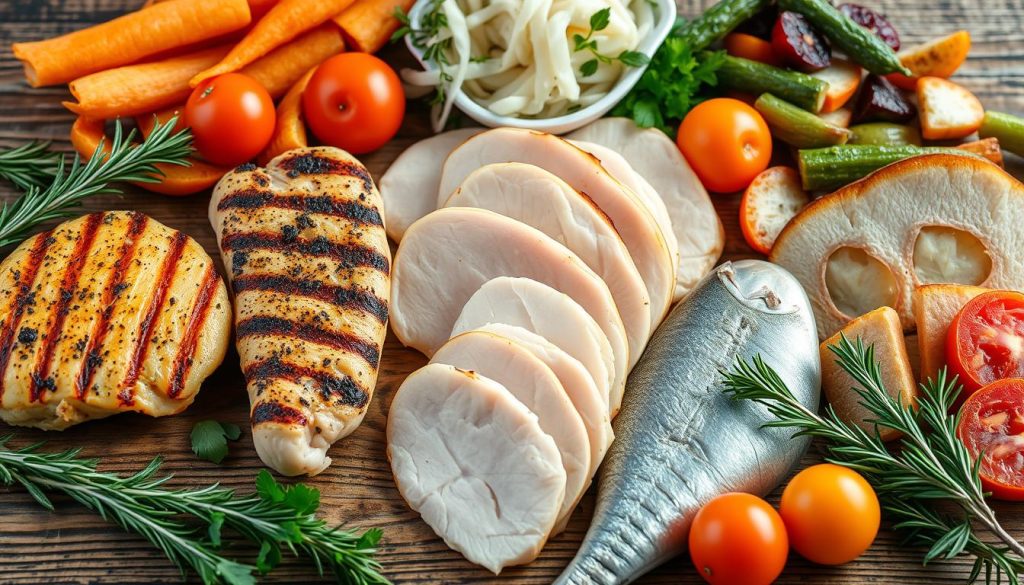
“Lean meats are an excellent source of high-quality, complete protein that can benefit your overall health and fitness goals.”
When choosing lean meats, focus on cuts that are low in fat and high in protein. Opt for:
- Skinless chicken breasts
- Lean ground turkey
- Pork tenderloin
- Flank steak
- Bison
By emphasizing these lean protein foods in your diet, you can enjoy the benefits of complete protein without the extra fat and calories. Combine your lean proteins with fresh vegetables, whole grains, and healthy fats for a balanced, nutrient-rich meal. This supports your health and fitness goals.
Fish and Seafood: Omega-Rich Protein Sources
Fish and seafood are essential in a high-protein diet, offering a wealth of nutrients and omega-3 fatty acids. These aquatic treasures are a powerhouse for health and well-being. They provide a bounty of essential nutrients, making them a true powerhouse for your overall health and well-being.
Wild-Caught vs Farm-Raised Fish Options
Exploring fish options, it’s crucial to distinguish between wild-caught and farm-raised varieties. Wild-caught fish, such as salmon, trout, and tuna, are often superior in nutrient density and environmental impact. These fish thrive in their natural habitats, leading to a more robust nutritional profile and a lower risk of contaminants. In contrast, farm-raised fish, while more affordable and readily available, may have varying nutrient content based on farming practices.
Best Fish Varieties for Protein Content
- Tuna: A lean, protein-rich fish that is an excellent source of high-quality protein, as well as essential vitamins and minerals.
- Salmon: Known for its abundant omega-3s and high-protein content, salmon is a versatile and nutritious choice.
- Tilapia: This mild-flavored fish is a lean protein source and can be a budget-friendly option for protein-rich meals.
Seafood Preparation Methods
The preparation method significantly impacts the nutritional benefits of seafood. Grilling, baking, or broiling fish and seafood helps preserve their natural oils and nutrients. In contrast, frying or deep-frying can diminish these healthful properties. Choose simple seasoning and cooking techniques that highlight the natural flavors of the seafood. This ensures you maximize the nutritional benefits of these protein-rich, omega-rich foods.
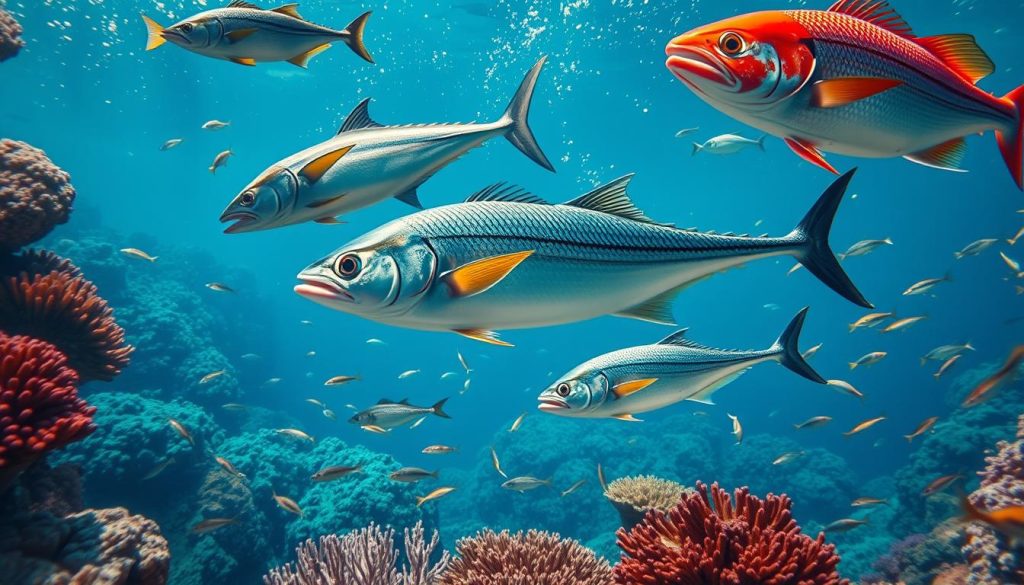
“Seafood is an excellent source of high-quality protein, and it’s also rich in omega-3 fatty acids, which are important for heart health and brain function.”
Eggs and Dairy: Versatile Protein Options
Eggs and dairy products stand out as formidable sources of protein. They not only offer a high-quality protein but also a variety of essential nutrients. These nutrients are crucial for a healthy diet and an active lifestyle.
Eggs are a complete protein, containing all the amino acids the body requires. A single large egg provides about 6 grams of protein. It also includes vitamins A, D, and B12, along with minerals like iron and zinc. Eggs can be prepared in numerous ways, from scrambled and poached to hard-boiled and used in baking.
Dairy products, such as milk, yogurt, and cheese, are also rich in protein. A cup of low-fat milk contains around 8 grams of protein. Greek yogurt can offer up to 20 grams per serving. These protein-packed foods are versatile, fitting well into smoothies, salads, and snacks. They help meet your daily protein for diet and protein for fitness needs.
“Eggs and dairy are incredibly versatile when it comes to adding high-quality protein to your meals and snacks. They’re convenient, affordable, and packed with essential nutrients that support overall health and wellness.”
Looking to build muscle, maintain a healthy weight, or simply fuel your body? Don’t overlook the importance of eggs and dairy in a balanced diet. Explore different ways to include these nutritious options in your daily routine for optimal benefits.
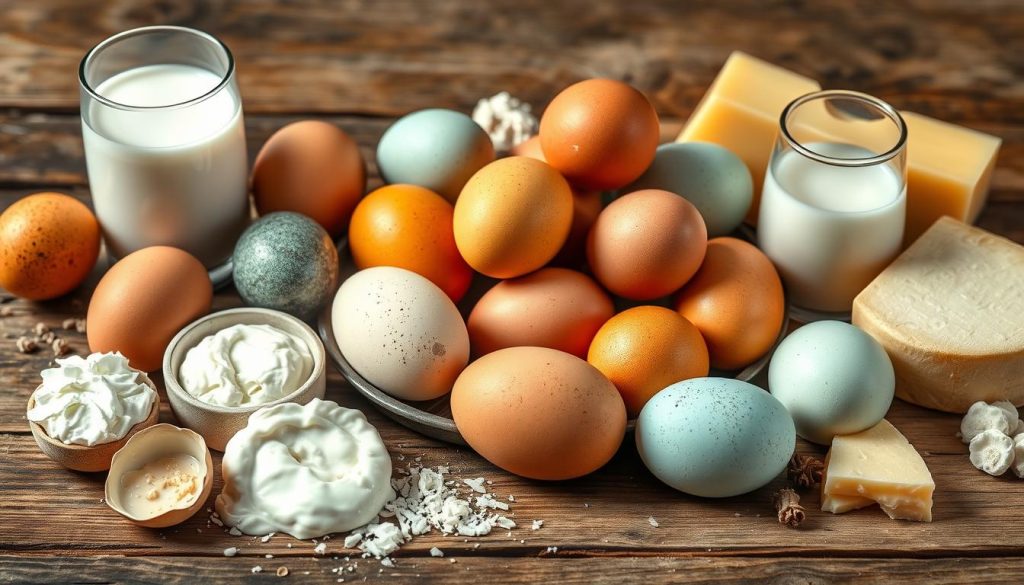
Plant-Based Protein-Rich Foods
Exploring plant-based protein sources is a wise choice for a balanced diet. Legumes, beans, nuts, seeds, and whole grains are rich in essential nutrients. These vegetarian protein sources and vegan protein sources offer numerous health benefits.
Legumes and Beans
Legumes, including lentils, chickpeas, and black beans, are high in plant-based proteins. They provide protein, fiber, complex carbohydrates, and various vitamins and minerals. Adding legumes and beans to your meals increases protein intake and adds flavor and texture.
Nuts and Seeds
Nuts and seeds are excellent for vegetarian protein sources and vegan protein sources. Almonds, walnuts, chia seeds, and flaxseeds are rich in protein, healthy fats, and essential vitamins and minerals. Snacking on nuts or adding seeds to meals is a tasty way to boost protein.
Whole Grains
Whole grains, like quinoa, brown rice, and oats, are often underappreciated as plant-based proteins. They offer sustained energy and contribute to protein intake. Adding whole grains to your diet is a simple way to increase vegetarian protein sources and vegan protein sources.
Exploring the variety of plant-based proteins allows for a balanced, nutritious diet. It meets daily protein needs while enjoying the flavors and health benefits these foods provide.

High-Protein Breakfast Ideas
Begin your day with a protein-rich breakfast to energize your body and sustain you through the morning. High-protein foods in your first meal offer numerous benefits, including muscle recovery and blood sugar stabilization. Discover these tasty and nutritious breakfasts, all packed with protein.
Savory Protein-Rich Breakfast Ideas
- Scrambled eggs with sautéed spinach and diced avocado
- Greek yogurt parfait layered with fresh berries and toasted almonds
- Quinoa breakfast bowl topped with poached eggs, roasted vegetables, and a drizzle of tahini
Sweet Protein-Packed Breakfast Treats
- Protein-rich overnight oats made with chia seeds, peanut butter, and bananas
- Whole-grain toast topped with mashed avocado and a sprinkle of feta cheese
- Protein-packed smoothie blended with Greek yogurt, frozen fruit, and a scoop of plant-based protein powder
“Starting your day with a protein-rich breakfast is a game-changer for energy and focus.”
Whether you lean towards savory or sweet, there are countless ways to add protein-rich foods to your morning. By starting with high-quality protein, you prepare your body for a day filled with productivity and energy.

Protein-Rich Snacks for Weight Management
## Protein-Rich Snacks for Weight Management
Attaining a healthy weight necessitates a diet rich in protein. Protein-rich snacks are invaluable for weight management, offering sustained energy and satiety between meals. They support your fitness objectives with their delicious and nutritious qualities.
### Quick Protein Snacks for Athletes
Active individuals, like athletes, require quick, portable snacks to fuel their bodies and aid in recovery. Some excellent options include:
- Greek yogurt with fresh berries
- Hard-boiled eggs
- Protein bars or energy bites made with ingredients like nuts, seeds, and nut butter
- Cottage cheese with sliced cucumbers and cherry tomatoes
### Portion Control Guidelines
Portion control is crucial for protein-rich snacks to manage weight effectively. Adhere to these guidelines to ensure the right protein intake without excess:
- For nuts and seeds, aim for a small handful (about 1-2 ounces)
- For cheese, opt for a single-serving portion (about 1-2 ounces)
- For protein bars or shakes, follow the recommended serving size on the label
- For dips and spreads, use them sparingly and pair with veggie sticks or whole-grain crackers
Incorporating high-protein snacks, protein foods for weight loss, and protein-packed snacks into your daily routine aids in weight management. It also fuels your body with essential nutrients.
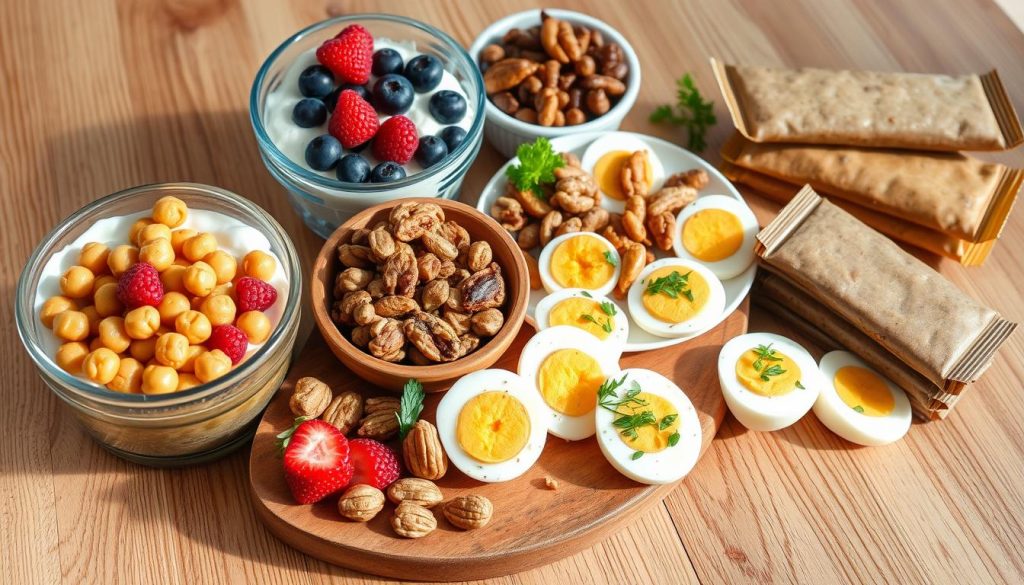
“Snacking on protein-rich foods can help curb hunger and support weight loss by keeping you feeling full and satisfied between meals.”
Best Protein Sources for Muscle Building
Building strong, lean muscles necessitates a consistent intake of high-quality protein. Whether you’re an athlete, bodybuilder, or simply looking to enhance your physique, selecting the appropriate protein foods is crucial. It significantly impacts muscle growth and recovery. Let’s delve into the premier protein sources for your muscle-building endeavors.
Lean Meats: A Muscle-Building Powerhouse
Lean cuts of meat, such as chicken breasts, turkey, and sirloin steak, stand out as top protein for building muscle. These protein-rich foods boast a complete amino acid profile. This ensures your muscles receive the essential building blocks for growth and repair.
Seafood: Omega-Rich Protein Options
Fish and seafood, including salmon, tuna, and shrimp, are not only rich in protein foods for muscle growth but also in omega-3 fatty acids. These healthy fats are vital for overall well-being. They also aid in muscle recovery and growth.
Eggs and Dairy: Versatile Protein Choices
Eggs and dairy products, such as milk, cheese, and Greek yogurt, are also excellent protein sources for building muscle. They offer a well-balanced amino acid profile. Moreover, they are simple to integrate into your daily diet.
Plant-Based Protein Powerhouses
For those adhering to a plant-based diet, legumes, beans, nuts, and seeds are superb protein for building muscle. Although they lack a complete amino acid profile, strategic combinations can offer a comprehensive protein foods for muscle growth source.
Incorporating a variety of these protein foods for muscle growth into your daily meals and snacks is beneficial. It supports your muscle-building objectives and fosters overall health and well-being.
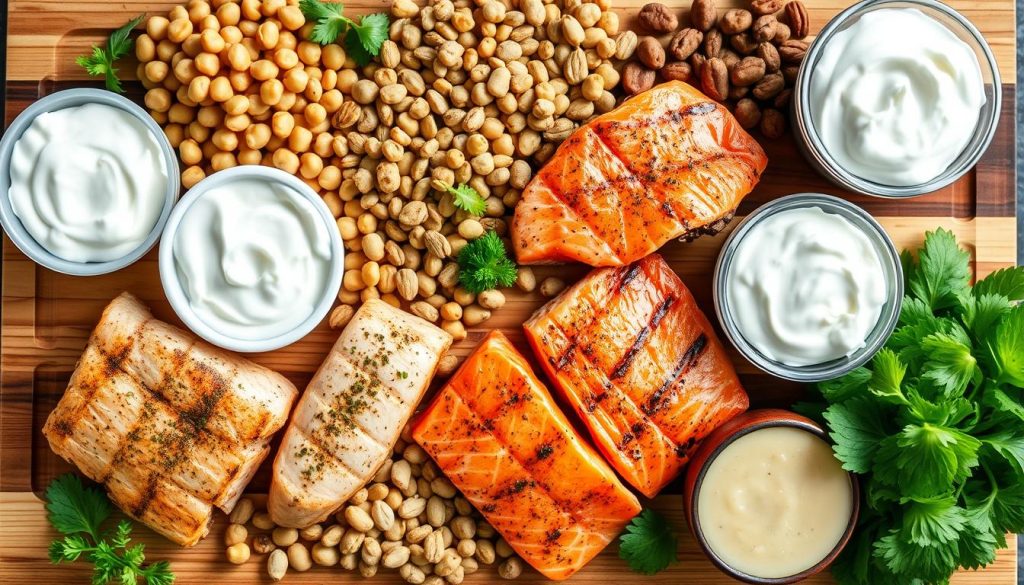
Vegetarian and Vegan Protein Alternatives
For those on plant-based diets, finding high-quality protein sources is crucial. Fortunately, a variety of vegetarian and vegan protein alternatives exist. These include complete plant protein combinations and innovative meat substitutes. This section delves into the best options for a plant-powered lifestyle.
Complete Plant Protein Combinations
On a vegetarian or vegan diet, achieving complete proteins is straightforward with the right pairings. Combining complementary plant-based proteins, such as legumes and whole grains, ensures all essential amino acids are met. Some effective combinations include:
- Rice and beans
- Lentils and quinoa
- Hummus and whole-wheat pita
- Nut butter and whole-grain toast
Meat Substitutes Guide
The plant-based protein market has seen significant growth, offering a variety of meat substitutes for vegetarians and vegans. These products, ranging from soy-based burgers to mushroom-based “meat,” mimic animal proteins’ taste and texture. They provide a nutritious, high-protein alternative. Some top-rated options include:
- Tofu and tempeh
- Seitan (wheat-based meat alternative)
- Jackfruit (for a pulled-pork texture)
- Portobello mushrooms
- Lentil or bean-based burgers
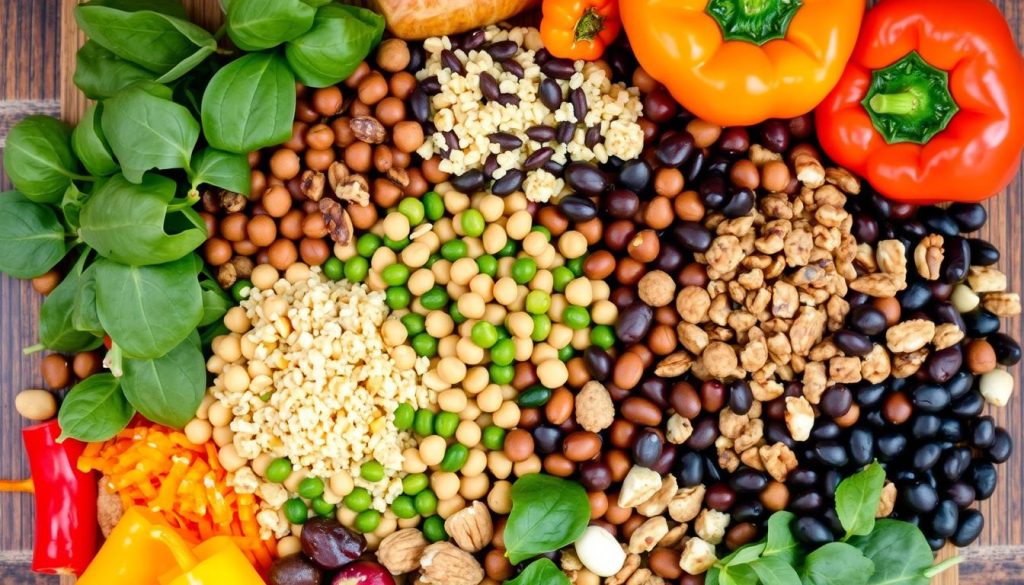
“Variety is key when building a balanced, protein-rich vegetarian or vegan diet. Explore a wide range of plant-based protein sources to ensure you’re meeting your body’s needs.”
Protein Supplements and Powders Guide
Exploring the realm of protein supplements and powders can seem overwhelming. This detailed guide aims to simplify your journey. Whether you aim for muscle growth, recovery, or general health, grasping the various protein supplement types is essential. It’s vital to discern which one suits your specific requirements.
Types of Protein Supplements
The prevalent categories of protein supplements encompass:
- Whey Protein – a rapidly digestible, complete protein, perfect for post-exercise recovery and muscle enhancement.
- Casein Protein – a slower-digesting protein, offering a consistent amino acid supply throughout the day.
- Plant-Based Proteins – like soy, pea, or hemp, suitable for vegetarians and vegans.
- Blended Proteins – a mix of various proteins, providing a broad spectrum of amino acids.
Choosing the Right Protein Supplement
In selecting a protein supplement, consider your fitness objectives, dietary restrictions, and lifestyle. Protein supplements can enrich a balanced diet, facilitating increased protein intake for recovery and muscle development. Nonetheless, it’s crucial to opt for a high-quality, trustworthy brand and avoid excessive protein consumption.
“Protein supplements can be a helpful tool, but they should not replace a nutrient-dense, whole-food diet.”
The ideal protein supplement hinges on your unique needs and preferences. Seek advice from a healthcare professional or registered dietitian to craft a tailored plan. This should align with your fitness aspirations and overall health.
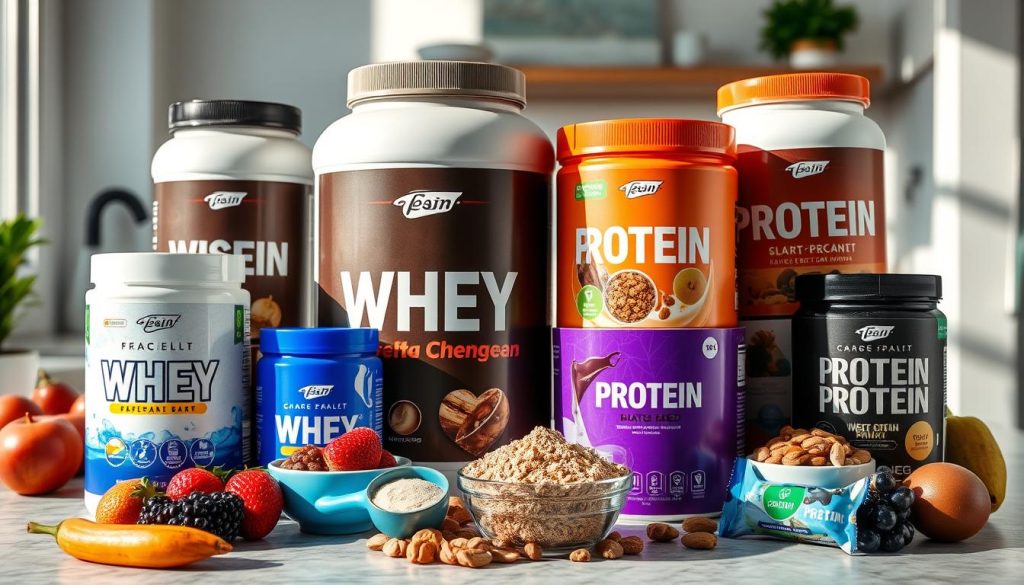
Protein-Rich Foods for Weight Loss
Reaching your weight loss objectives doesn’t necessitate a reduction in protein consumption. Instead, integrating the appropriate protein-rich foods into your regimen can significantly alter your approach. By strategically timing your protein intake and selecting calorie-efficient options, you can foster both muscle preservation and fat reduction.
Timing Your Protein Intake
Protein is crucial for maintaining lean muscle mass, even when calorie intake is restricted. To optimize its advantages, ensure a protein-rich food is included at every meal and snack. This strategy aids in appetite regulation, stabilizes blood sugar, and ensures a continuous supply of amino acids for muscle repair and recovery.
Calorie-Efficient Protein Sources
- Lean meats like chicken, turkey, and lean beef
- Fish and seafood, such as salmon, tuna, and shrimp
- Eggs and low-fat dairy products
- Plant-based options like lentils, chickpeas, and tofu
These protein-rich foods are not only rich in nutrients but also contain fewer calories, making them perfect for a protein diet plan focused on weight loss. By incorporating them into your meals and snacks, you can experience prolonged satiety while supporting your best protein sources for weight loss.
“Protein is an essential macronutrient that plays a vital role in weight management. By strategically including protein-rich foods in your diet, you can achieve your health and fitness goals.”

Meal Prep Tips for High-Protein Diets
Adhering to a high-protein diet can be daunting, particularly when time constraints hinder meal planning and preparation. Nonetheless, with strategic meal prep, you can guarantee a constant supply of protein-rich foods. These practical strategies will simplify your meal planning, making a high-protein diet more accessible than ever.
Plan Ahead
Begin the week by outlining your meals. This step enables you to pinpoint essential protein ingredients and compile a comprehensive grocery list. Opt for recipes that leverage common ingredients across various dishes to optimize your time and resources.
Batch Cook Protein-Rich Meals
Devote a few hours to cooking substantial batches of high-protein dishes such as grilled chicken, baked salmon, or vegetarian chili. These dishes can be divided into portions and stored in the fridge or freezer for swift reheating throughout the week.
Prepare Grab-and-Go Protein Snacks
- Hard-boiled eggs
- Protein bars or energy bites
- Greek yogurt with berries
- Nut butter and apple slices
Preparing protein-rich snacks in advance ensures you can maintain your high-protein diet even between meals. This approach keeps your energy levels consistent and supports your dietary goals.
“Meal prepping is a game-changer for maintaining a healthy, high-protein lifestyle. With a little advance planning, you can ensure you always have nutritious, protein-rich meals ready to enjoy.”
Adopting these meal prep strategies will significantly enhance your high-protein diet. A modest initial investment of time will yield a bounty of protein-rich meals and snacks, bolstering your health and fitness objectives.
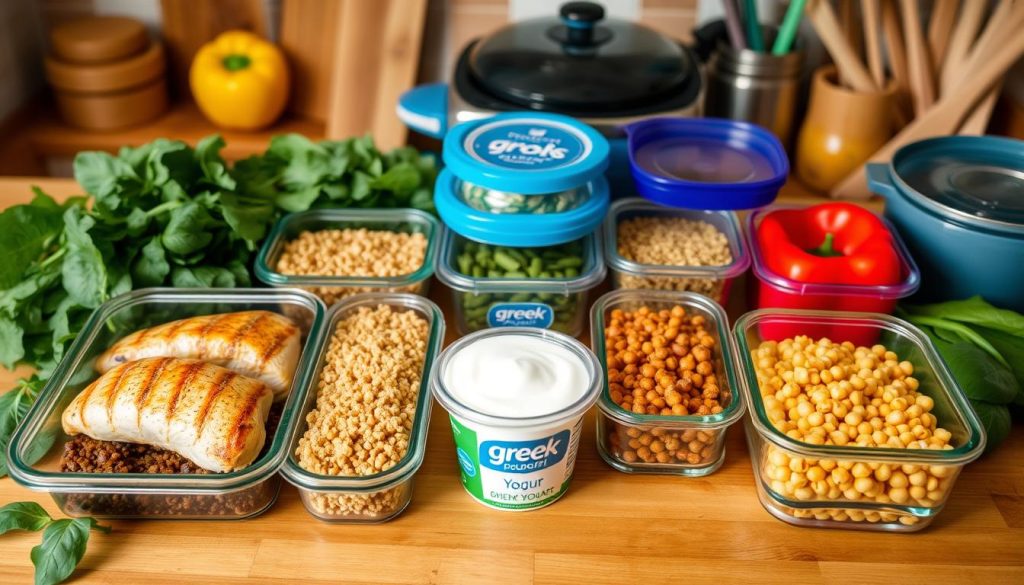
Common Myths About Protein Consumption
Protein, a vital macronutrient, is often shrouded in misconceptions. These myths can impact our understanding of its role in health. Let’s explore and debunk these myths, revealing the scientific truths behind them.
Scientific Facts vs Popular Beliefs
Contrary to widespread beliefs, excessive protein intake does not inevitably cause kidney damage or osteoporosis. Research indicates that healthy individuals can safely consume higher protein diets without adverse effects on kidney function or bone health. However, those with pre-existing kidney or liver conditions must closely monitor their protein intake.
Protein Absorption Myths
Another prevalent myth is that the body can only absorb a limited amount of protein per meal. In reality, the body’s ability to utilize and absorb protein is influenced by several factors. These include the type of protein, overall dietary intake, and individual differences. Consuming protein-rich foods throughout the day can optimize absorption and utilization.
By understanding the scientific facts and debunking these common protein myths, you can make informed decisions. This ensures the incorporation of this essential macronutrient into a healthy, balanced diet. Such a diet supports your overall well-being.
FAQ
What are the daily protein requirements based on age and activity level?
Daily protein intake varies with age and activity level. Adults generally need 0.8-1 gram of protein per kilogram of body weight. Active individuals and athletes may require up to 1.6-2.2 grams per kilogram.
How does protein support various body functions?
Protein is vital for muscle growth and repair, hormone production, and immune function. It also transports essential nutrients and maintains healthy skin, hair, and nails.
What are the signs of protein deficiency?
Protein deficiency symptoms include fatigue, muscle weakness, slow wound healing, and edema. Hair loss and weakened immune function are also signs. Adequate protein intake is crucial for overall health.
What are the benefits of incorporating lean meats into a balanced diet?
Lean meats are rich in high-quality protein and essential amino acids. They support muscle building and recovery, enhancing overall health. Including lean meats in your diet helps meet daily protein needs.
What are the differences between wild-caught and farm-raised fish?
Wild-caught fish have more omega-3 fatty acids and fewer contaminants than farm-raised fish. Both are nutritious, but the choice depends on availability, sustainability, and personal preference.
How can I incorporate more eggs and dairy products into my diet?
Eggs and dairy products are versatile and can be enjoyed in various ways. From scrambled eggs to yogurt and cheese, they can be easily added to meals and snacks.
What are some examples of plant-based protein sources?
Legumes, nuts, seeds, whole grains, and soy-based products are excellent plant-based protein sources. Combining these can create complete protein profiles.
What are some high-protein breakfast ideas?
High-protein breakfast options include Greek yogurt with berries and granola, eggs with whole-grain toast, and oatmeal with milk or protein powder. Smoothies with protein powder or Greek yogurt are also great choices.
How can I incorporate protein-rich snacks into my weight management plan?
Protein-rich snacks like Greek yogurt, hard-boiled eggs, and nuts can help manage weight. Choose nutrient-dense, low-calorie options and be mindful of portion sizes.
What are the best protein sources for building muscle?
Lean meats, fish, eggs, dairy, and certain plant-based options like soy and quinoa are ideal for muscle building. Timing protein intake around workouts is crucial for muscle growth and recovery.
What are some complete plant protein combinations?
Combining beans and rice, lentils and quinoa, or hummus with whole-grain pita creates complete plant-based protein sources. These combinations provide all essential amino acids for optimal protein synthesis.
How do I choose the right protein supplement for my needs?
Consider your goals, dietary preferences, and restrictions when choosing a protein supplement. Whey, casein, plant-based, and collagen-based options are available. Consult a healthcare professional for the best choice.
How can protein-rich foods support weight loss efforts?
Protein-rich foods promote fullness, support muscle mass, and boost metabolism, aiding in weight loss. Timing protein intake, focusing on calorie-efficient sources, and incorporating protein-rich meals and snacks are beneficial.
What are some tips for meal prepping high-protein meals?
Effective meal prep involves cooking large batches of lean proteins and prepping protein-rich snacks. Store meals in portion-controlled containers for easy access throughout the week.
What are some common myths about protein consumption?
Myths include excessive protein harming kidneys, supplements being necessary for muscle growth, and protein being only for bodybuilders. Scientific evidence supports moderate, balanced protein intake as safe and beneficial for most healthy individuals.

